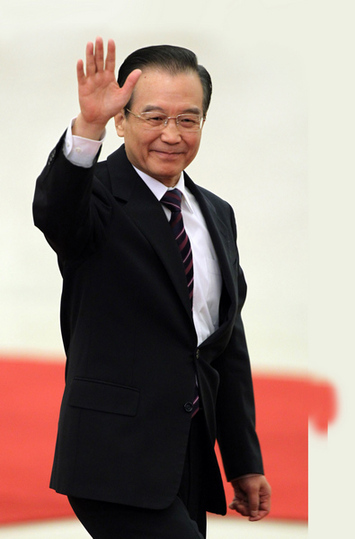 |
|
|
|
|||||||||||
Premier highlights the challenges and opportunities at final NPC news conference
|
 |
|
Premier Wen Jiabao arrives for a news conference on Wednesday at the Great Hall of the People in Beijing. [Wu Zhiyi / China Daily] |
Premier Wen Jiabao, at his final National People's Congress (NPC) news conference on Wednesday, called for reforms and set a path of both opportunity and challenge for his successor.
The Fifth Session of the 11th NPC closed on Wednesday. At the session, the NPC adopted a number of important documents, including the government work report, the central budget and the national economic and social development plan for 2012, as well as the amendment to the Criminal Procedure Law.
It also adopted decisions on deputy election for the 12th NPC and methods for the election of deputies to the 12th NPC from Hong Kong and Macao special administrative regions as well as the work reports of the NPC Standing Committee, the Supreme People's Court and the Supreme People's Procuratorate.
Addressing a range of issues, Wen said that currency reform will remain on the agenda, housing prices will be reined in and debts racked up by local governments will be dealt with. He also said that private capital would be allowed in the financial sector, and political reform would be pushed forward.
As the economy continues to develop, problems have arisen such as income disparity and corruption, and only economic and political reform can resolve these issues, Wen said.
"Reforms in China have come to a critical stage," he told about 1,000 reporters from domestic and international media organizations after the conclusion of this year's meeting of the NPC.
"Reform can only go forward and must not stand still or go backward because that offers no way out."
Wen mentioned the need for political reform. "Without successful political reform, it's impossible for China to fully institute economic reform and the gains we have made in these areas may be lost."
Wen has addressed the urgency of reform on many occasions over the past few years. On Wednesday, he said that his long interest comes from "a strong sense of responsibility".
|
 |
However, Wen made it clear that reforms should be gradual and prudent, as people must take into consideration national circumstances and the population of 1.3 billion.
"And I know, very well, that reform will not be easy and it cannot succeed without the consciousness, the support, the enthusiasm and creativity of our people," Wen said.
Ma Huaide, vice-president of the China University of Political Science and Law, said Wen's words showed "great determination".
"He's trying to inspire the people and the society to bring in changes," he said.
Lau Nai-keung, a political commentator in Hong Kong, said continued reform and opening-up has been the general consensus as well as national policy.
"If we decide to push ahead in this direction, we will succeed provided the moves are supported by the people and are grounded in our socio-political and cultural reality," Lau said.
While looking back on his nine-year tenure on Wednesday, which is expected to end next March, Wen appeared emotional and said he should assume responsibility for problems that had occurred in the economy and society during his term of office.
"I feel truly sorry," Wen said. Due to various factors, "there is still much room for improvement in my work".
In the last year in office, Wen said, he would be as committed as ever and continue his best efforts to serve the people, to make up for the shortfall in his work with new achievements, and to win the people's "understanding and forgiveness".
The government will formulate a plan this year for income distribution reform, he said. It will also introduce a land requisition regulation to better protect farmers' property rights, ensure the promised input in education matches 4 percent of GDP, expand coverage of the pension system and improve poverty alleviation.
"We're determined to accomplish these tasks rather than pass on the problems to the next government," he said.
He placed hope in the next generation and had full confidence that they would better his achievements, he said.
In his 45 years of service he had always strived with passion and energy to serve the country and the people and had never pursued personal gain, he said.
"I have the courage to face the people, and to face history," Wen said.
"There are people who will appreciate what I have done but there are also people who will criticize me," he said. "Ultimately, history will have the final say."
Amendments in the government report
|
1.Original:To curb the blind expansion of the solar and wind energy industry. |
|
Amended:To prevent the blind expansion of the manufacturing capacity of solar and wind energy facilities. "We should prevent the industry from over-expansion because many local governments blindly launch projects. We should develop new energy. The word "curb" sounds like it is something that we should not do. The amendment is more precise and could help encourage the healthier development of the new energy industry." Qin Shaode,chairman of Shanghai Social Sciences Association |
|
2.Original:To improve management of the safety of school buses. |
|
Amended:To improve management of the safety of school buses and on campus. "In some Western countries, violence frequently occurs on campus. Improving the safety of school buses is just a part of the job to be done. We should pay more attention to ensuring safety on campus because this is in line with parents' hopes and a necessary step to protect students' rights." Cheng Enfu,director of Academy of Marxism, Chinese Academy of Social Sciences |
|
3.Original:To improve grassroots self-governance in urban and rural areas. |
|
Amended:To improve grassroots self-governance in urban and rural areas and make social organizations play a more active role in social management. "The involvement of more social organizations could make social management more scientific and reasonable. Bringing non-governmental organizations and seniors', women's and young people's organizations into the process of social management could allow more views to be heard and would help the government optimize public services." Zeng Qinghong,mayor of Jiujiang city, Jiangxi province |
|
4.Original:To strengthen and improve petition work. |
|
Amended:To strengthen and improve petition work and improve the mechanisms to receive the public's appeals and opinions. "As a judge, I think it's quite necessary to set up efficient channels for the public to express their opinions and make appeals. The mechanism should first address the problem of how people can make their expressions be heard and then how the Party, the government and judicial bodies deal with them." Kang Weimin, president of Hunan High People's Court |
|
5.Original:To support the coordination of enterprises that "go out" by investing overseas and help them jointly develop. |
|
Amended:To support the coordination of enterprises that "go out" by investing overseas and help them jointly develop and regulate and develop labor outsourcing. "It is not only the enterprises that go out, but also workers. Labor outsourcing could help promote employment and deal with the large quantity of surplus labor in rural areas. Currently, there are some illegal labor companies in the market. Better regulation of labor outsourcing could help protect outsourced workers' rights and better develop the industry." Yin Guangjun,deputy president, China Council for Promotion of International Trade, Cangzhou sub-council |
Wang Huazhong in Beijing and Bob Lee in Hong Kong contributed to this story.
Contact the writer at zhuzhe@chinadaily.com.cn
Wu Ying, iPad, Jeremy Lin, Valentine's Day, Real Name, Whitney Houston, Syria,Iranian issue, Sanyan tourism, Giving birth in Hong Kong, Cadmium spill, housing policy

|

|

|

|

|

|